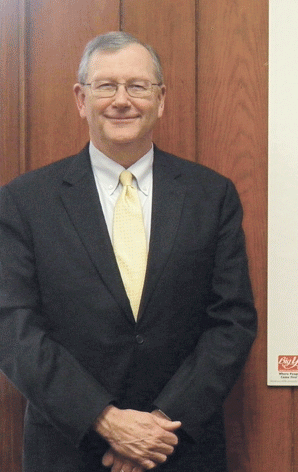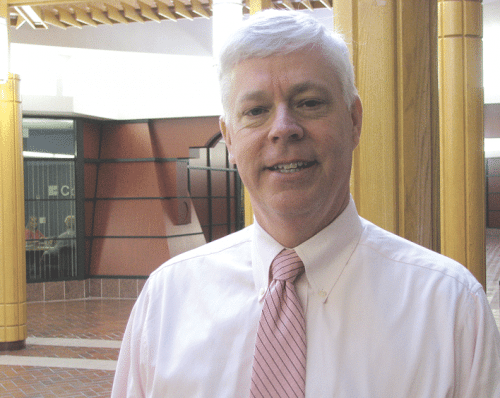
Holding the Line
Natural-gas Issues Could Hinder Economic Development

Kenn Delude says businesses looking to locate in Western Mass. could be scared off by limited access to natural gas.
“It’s a very real pocketbook issue. The average resident saw what happened to their electric bill this winter; it went up drastically because of the availability and price of natural gas,” said Sullivan, president of the Western Massachusetts Economic Development Council (EDC). “Right now, natural gas is setting the price for power in this region.”
But, on a larger scale, it’s also setting back the region’s economic-development potential at a time when Western Mass. is starting to see signs of growth and recovery.
The issue is natural-gas capacity in Massachusetts. Simply put, demand for natural gas — among the cleaner and more plentiful fossil fuels available today — has begun to outstrip the capacity of the Commonwealth’s pipeline distribution system.
As a result, Columbia Gas stopped accepting new customers in Easthampton and Northampton at the end of 2014. Berkshire Gas did the same for new customers in Franklin County around the same time, and has since imposed a similar moratorium on Amherst, Hadley, and Hatfield. Similarly, National Grid has a moratorium in place on Cape Cod.
Kenn Delude, president and CEO of Westmass Development Corp., which works to attract new businesses to the region, said the natural-gas shutoff to those communities might hinder future development.
As an example, he cited American River Nutrition, a company that develops and produces natural products to stem age-related or degenerative disease states. The firm has been in the region for 17 years and recently signed a deal for 25,000 square feet of additional space in the Hadley University Industrial Park.
“They’re a local company, and they got trapped by the moratorium — shut off, if you will,” Delude said. “They were counting on — and all their permits and plans were approved for — natural gas. And now, because of the moratorium, they’re forced to find an alternative fuel source.”
That source is propane, which is much more expensive than natural gas, and requires outdoor tanks and truck delivery.
“Propane is not necessarily a good alternative,” Delude said. “It can certainly be very difficult and expensive and challenging to run an industrial plant on propane, especially one of any size. Propane is not the ideal substitute for natural gas.”
The impact, however, extends far beyond companies already established in Western Mass.
“We’re already in a region of the country where utility rates are very high compared to other sections of the country,” Delude said. “This is all about competition for businesses, competing with the Southeast or the Southwest or somewhere else that doesn’t have the same challenges.”
And in communities hit by the recent moratoriums — which are expected to last years — developers are going to be very restricted, he went on. “And it occurs at a very, very difficult time. We spent nearly eight years working through an economic downturn as a region, and we might be at the beginning of a recovery, where we’re starting to see growing businesses need to expand. With this situation where we don’t have any gas, we’re not going to be able to attract certain businesses — and it’s not a short-term problem.”
Outside the Lines
Sullivan, who was secretary of Energy and Environmental Affairs under Gov. Deval Patrick, said that administration was fretting over a growing natural-gas capacity issue three years ago.
“The Patrick administration was concerned about the growing demands for natural gas,” he said. “In the big picture, you’ve got a lot of newer generators going online with natural gas as the primary source of fuel, or converting over to natural gas. In combination with coal going offline and some of the nuclear generators going offline, there is obviously a need [for distribution].”

Rick Sullivan says the state needs to find a way to balance pipeline expansion with continued development of renewable-energy sources.
“Our first and foremost responsibilities to our customers are safety and reliability,” Berkshire Gas President Karen Zink said in a statement earlier this year. “The only way that we can assure continued safety and reliability, given current circumstances, is to invoke an across-the-board moratorium. We are in the business of selling and delivering natural gas, and as such, be assured that a moratorium is the last option that we would consider. But reasonable system planning and operation requires that we do so at this time to assure continued reliability for our existing customers.”
She and others noted that inexpensive natural gas has never been more plentiful in the U.S., and that the ability to deliver it to customers is the only challenge.
“There’s no doubt there’s a need currently and going forward,” Sullivan told BusinessWest. “We need future additional generation and additional capacity. Some of that can be filled with true energy efficiency, some filled by renewable energy, but even with all of that, there’s still a need for some additional natural-gas capacity.
“Here in New England — Massachusetts specifically — the infrastructure is old, and it’s also built to a standard of years ago, that no longer meets the needs of today,” he added. “So we had the beginnings of discussions — six New England governors talking about the need to bring in some additional capacities, meaning pipelines. Also, at the same time, we talked about how we can build transmission lines for electricity to hook up to wind and renewable sources, mostly to the north, and also Canadian hydroelectric.”
Patrick supported a bill three years ago that would have paved the way for pipeline expansion, but it ultimately did not pass. For its part, Kinder Morgan has run into often highly coordinated opposition from land owners, conservationists, and other citizens concerned about running a pipeline 180 miles across Northern Mass. — even after the company shifted a long portion of the proposed route into Southern New Hampshire.
When the Franklin Regional Council of Governments asked Kinder Morgan why the pipeline couldn’t run along the Mass Pike, the company said routing lines along existing highway or road corridors presents several challenges.
“First and foremost is safety,” it noted. “Highway corridors generally already have existing utility infrastructure located in or around their corridors. By locating a pipeline in a separate corridor, there is much less likelihood that damage will occur to the existing infrastructure during construction, or that the new pipeline will be damaged by third-party construction or maintenance activities by other utilities or road crews. Separate corridors are also generally less populated as compared to road corridors.”
That doesn’t placate Northern Mass. land owners whose property would be disturbed for a pipeline, and Sullivan understands their concerns. “With energy, there’s never an easy solution, never anything everyone can agree on. For every good thing it can do, there is another side of the coin. To get increased pipeline capacity into the region means you have to build new or expand existing pipelines, and that means construction; that means disturbing rights of way. Everybody needs to understand what those impacts are.”
Then there’s the philosophical question of whether the state should build more capacity for fossil fuel or force additional conservation efforts and renewable-energy generation, such as solar and wind. It’s a question, he said, that must be answered eventually.
“We have concerns about being able to do economic development, particularly as we’re coming into a time of increased interest in Western Mass., either by expansion of existing companies or new companies moving into the region,” Sullivan explained. “Obviously, part of what they look at is, what is the reliability and cost of power? We cannot, from an economic-development point of view, be in a position to say, ‘sorry, we’d love to have you come, but we can’t hook you up to natural gas or supply you with power.’”
Waiting Game
Meanwhile, the ability of energy companies to supply natural gas to new customers — existing customers are not expected to be affected by the moratoriums — is dwindling.
“We have not yet issued a moratorium for gas customers; we have capacity at the moment,” said James Lavelle, manager of Holyoke Gas & Electric. “But we are close to the limit of what we can reliably serve; we don’t have a lot of room for large industrial growth. We can bring in the equivalent of a couple of large industrial customers; that’s what we can accommodate at the moment. But we would like to have much more room than that.”
Even without a moratorium, he said, customers have to deal with cost increases during peak periods as a result of capacity constraints.
“It is to some degree a waiting game,” he said. “The pipeline companies would bring additional capacity, but they have to get various approvals. There also has to be a funding mechanism in place. We’ve had discussions about whether pipeline companies are going to get secured contracts from gas-distribution companies like Holyoke Gas & Electric or Columbia. The other discussion is a tariff, through ISO New England, where the electric rate payers would potentially finance the pipeline.”
Lavelle agreed with Sullivan and Delude, however, that the natural-gas capacity problem is very much an economic-development issue.
“Without doubt there will be impacts,” Delude added. “You may not see most of them or hear of most of them. When word gets out that there’s no natural gas available, you won’t know when a site selector Googles an article or two about gas not being available, and decide they’re not able to give your site consideration.”
But the impact of those invisible decisions could be felt over time, he told BusinessWest, adding that the EDC benefits from the leadership of Sullivan, who is well-versed in economic development, energy policy, and the workings of municipal government, as former mayor of Westfield.
“Ultimately,” Sullivan said, “the responsible position, one the EDC has taken, is that we need more capacity, we support additional capacity, but we don’t necessarily pick which pipeline or how that line would be built or where it should go, specifically. The whole process needs to be honest and transparent, and needs to play out. Whatever the answer is, it has to bring some relief to the capacity issues in Western Mass.”
He added that any pipeline expansion doesn’t have to be overbuilt, and there’s no reason why the state can’t continue to move forward on developing new renewable-energy solutions at the same time. He understands, as well, the environmental concerns some people have about accessing the massive shale reserves from which companies like Kinder Morgan draw.
“Again, that’s another issue,” Sullivan said. “Many passionate people argue on the environmental side of things as well. There’s just nothing easy, or something absolutely everyone can agree on, when it comes to energy. It’s not an easy issue.”
But it could be a precarious one for the entire Western Mass. economy if it isn’t resolved soon, Delude said.
“Clearly, this is a broad-based challenge at a time when the region is beginning to show signs of recovery,” he noted. “Businesses have done a great job becoming more efficient, but at some point, you can only do so much with the space you have, and without gas, it’s going to be a challenge to expand and grow.”
Joseph Bednar can be reached at [email protected]





